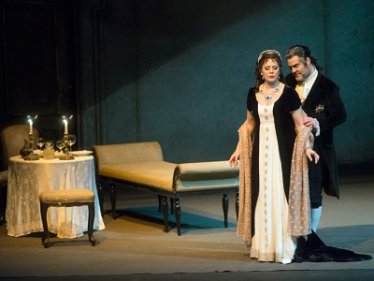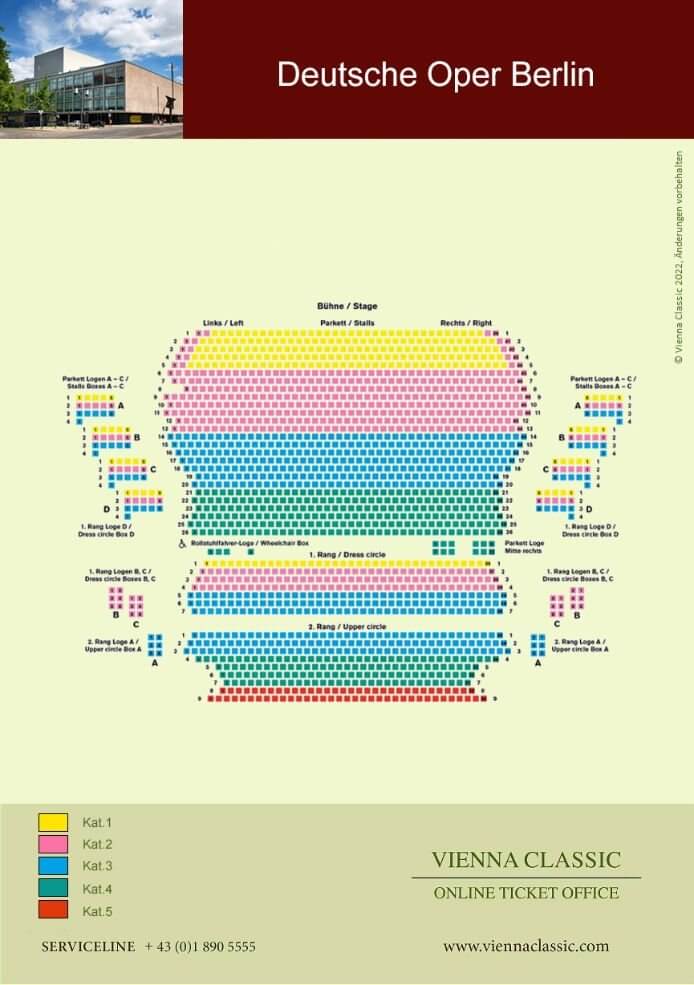Tosca - Schedule, Program & Tickets
Tosca
Date:
Time:
Price class:
Location:
16.06.2024 , Sunday
19:30
B
Deutsche Oper, Bismarckstraße 35, 10627 Berlin, Germany
Melodrama in three acts
Libretto by Giuseppe Giacosa and Luigi Illica
based on the drama LA TOSCA by Victorien Sardou
First performance on January 14, 1900 in Rome
Premiered at the Deutsche Oper Berlin on April 13, 1969
recommended from 13 years
3 hours 15 minutes / Two breaks
In Italian with German and English surtitles
Introduction: 45 minutes before the start of the performance in the foyer on the right
The literary template for Puccini's "torture opera" (Oskar Bie) was provided by Victorien Sardou (1831-1908) with his successful play LA TOSCA, which premiered in Paris in 1887 with Sarah Bernhardt in the title role. After Puccini had seen the piece on tour in Milan in 1889, he was immediately enthusiastic about the material. But the TOSCA plan was initially put on hold for six years until Puccini, presumably inspired by another performance of the Sardou drama in Florence and by Luigi Illica's work on a TOSCA libretto for the composer Alberto Franchetti (1860-1942), became interested in the finds stuff. After a "conspiracy" between Puccini, Illica and Ricordi, the publisher succeeds in persuading Franchetti to give up his TOSCA project and to hand over the setting rights to Puccini.
As in all of Puccini's operas, TOSCA also shows how human attention and culinary pleasure can be mutually dependent when the composer's artistic intentions become the benchmark for interpretation. Outcry and resignation are the essential conditions of Puccini's human attention: the pity that he composed is not content with abstract gestures, but aims at restlessness, at change. The "small things" that Puccini described as his subject with modern understatement become "big ones" if we only want them to. The connection between Puccini's choice of material, which was directly and indirectly influenced by the spirit of Zola, Hauptmann and Gorki, and his compositional style shows him both as a successor to Verdi and as a representative of verismo. As is well known, he was a great admirer of Wagner, but anything but an imitator. Rather, he created a very personal connection between some of the achievements of both. Working through all the refinements of harmony and all the differentiations of the instrumentation, he nonetheless freed the voice from the orchestral interweaving and at the same time gave it a much more broken, tonally sensitive accompagnato in the orchestra than the radically laconic Verdi. This is what the aesthetic theme of TOSCA stands for. The musical gesture is as brutal as it is tender, intelligent as it is sentimental, precise as it is dreamy. Puccini absolutely wants truth to life, accuracy even in the musical details, social attention, the poetic sound of the seemingly everyday, the heroic with calculation, the contrast between committed passion and cool distance.
The police chief Scarpia, the singer Floria Tosca and the painter Cavaradossi claim freedom in every personal variant: as a dynamic-subjective claim to power (Scarpia), as a rebellious ethos aiming for change (Cavaradossi), as private, simple and at the same time boundless love (Tosca).
In a time of epochal upheaval, such attitudes gain exemplary clarity. Depending on how we see ourselves and Puccini at this time, TOSCA remains a gothic romance or turns into a portent of the theme "freedom". In any case, each of the opposing partners pays for this love triangle with their death. Her death does not claim a halo of salvation, but is bitter, horrible, definitive.
Götz Friedrich's 1987 re-staging of Boleslaw Barlog's 1969 production, which was straightforward and focused on scenic concreteness, takes Puccini's intentions at his word - the mutual dependence of human attention and culinary pleasure is inspired by the music and is also the starting point for the scenic interpretation.
Subject to change.
Libretto by Giuseppe Giacosa and Luigi Illica
based on the drama LA TOSCA by Victorien Sardou
First performance on January 14, 1900 in Rome
Premiered at the Deutsche Oper Berlin on April 13, 1969
recommended from 13 years
3 hours 15 minutes / Two breaks
In Italian with German and English surtitles
Introduction: 45 minutes before the start of the performance in the foyer on the right
The literary template for Puccini's "torture opera" (Oskar Bie) was provided by Victorien Sardou (1831-1908) with his successful play LA TOSCA, which premiered in Paris in 1887 with Sarah Bernhardt in the title role. After Puccini had seen the piece on tour in Milan in 1889, he was immediately enthusiastic about the material. But the TOSCA plan was initially put on hold for six years until Puccini, presumably inspired by another performance of the Sardou drama in Florence and by Luigi Illica's work on a TOSCA libretto for the composer Alberto Franchetti (1860-1942), became interested in the finds stuff. After a "conspiracy" between Puccini, Illica and Ricordi, the publisher succeeds in persuading Franchetti to give up his TOSCA project and to hand over the setting rights to Puccini.
As in all of Puccini's operas, TOSCA also shows how human attention and culinary pleasure can be mutually dependent when the composer's artistic intentions become the benchmark for interpretation. Outcry and resignation are the essential conditions of Puccini's human attention: the pity that he composed is not content with abstract gestures, but aims at restlessness, at change. The "small things" that Puccini described as his subject with modern understatement become "big ones" if we only want them to. The connection between Puccini's choice of material, which was directly and indirectly influenced by the spirit of Zola, Hauptmann and Gorki, and his compositional style shows him both as a successor to Verdi and as a representative of verismo. As is well known, he was a great admirer of Wagner, but anything but an imitator. Rather, he created a very personal connection between some of the achievements of both. Working through all the refinements of harmony and all the differentiations of the instrumentation, he nonetheless freed the voice from the orchestral interweaving and at the same time gave it a much more broken, tonally sensitive accompagnato in the orchestra than the radically laconic Verdi. This is what the aesthetic theme of TOSCA stands for. The musical gesture is as brutal as it is tender, intelligent as it is sentimental, precise as it is dreamy. Puccini absolutely wants truth to life, accuracy even in the musical details, social attention, the poetic sound of the seemingly everyday, the heroic with calculation, the contrast between committed passion and cool distance.
The police chief Scarpia, the singer Floria Tosca and the painter Cavaradossi claim freedom in every personal variant: as a dynamic-subjective claim to power (Scarpia), as a rebellious ethos aiming for change (Cavaradossi), as private, simple and at the same time boundless love (Tosca).
In a time of epochal upheaval, such attitudes gain exemplary clarity. Depending on how we see ourselves and Puccini at this time, TOSCA remains a gothic romance or turns into a portent of the theme "freedom". In any case, each of the opposing partners pays for this love triangle with their death. Her death does not claim a halo of salvation, but is bitter, horrible, definitive.
Götz Friedrich's 1987 re-staging of Boleslaw Barlog's 1969 production, which was straightforward and focused on scenic concreteness, takes Puccini's intentions at his word - the mutual dependence of human attention and culinary pleasure is inspired by the music and is also the starting point for the scenic interpretation.
Subject to change.



